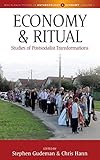Economy and Ritual : Studies of Postsocialist Transformations / ed. by Chris Hann, Stephen Gudeman.
Material type: TextSeries: Max Planck Studies in Anthropology and Economy ; 1Publisher: New York ; Oxford : Berghahn Books, [2015]Copyright date: ©2015Description: 1 online resource (214 p.)Content type:
TextSeries: Max Planck Studies in Anthropology and Economy ; 1Publisher: New York ; Oxford : Berghahn Books, [2015]Copyright date: ©2015Description: 1 online resource (214 p.)Content type: - 9781782385691
- 9781782385707
- Economic anthropology -- Europe, Eastern -- Case studies
- Economic anthropology -- Former Soviet republics -- Case studies
- Post-communism -- Social aspects -- Europe, Eastern -- Case studies
- Post-communism -- Social aspects -- Former Soviet republics -- Case studies
- Rites and ceremonies -- Economic aspects -- Europe, Eastern -- Case studies
- Rites and ceremonies -- Economic aspects -- Former Soviet republics -- Case studies
- SOCIAL SCIENCE / Anthropology / Cultural & Social
- Anthropology (General)
- 305.8009171 23
- GN585.E852 E46 2015
- online - DeGruyter
| Item type | Current library | Call number | URL | Status | Notes | Barcode | |
|---|---|---|---|---|---|---|---|
 eBook
eBook
|
Biblioteca "Angelicum" Pont. Univ. S.Tommaso d'Aquino Nuvola online | online - DeGruyter (Browse shelf(Opens below)) | Online access | Not for loan (Accesso limitato) | Accesso per gli utenti autorizzati / Access for authorized users | (dgr)9781782385707 |
Frontmatter -- Contents -- Illustrations -- Acknowledgments -- Map of Field Sites for Economy and Ritual Group -- Introduction:Ritual, Economy, and the Institutions of the Base -- 1 Economy as Ritual: The Problems of Paying in Wine -- 2 Animals in the Kyrgyz Ritual Economy: Symbolic and Moral Dimensions of Economic Embedding -- 3 From Pig-Sticking to Festival Changes in Pig-Sticking Practices in the Hungarian Countryside -- 4 Kurban: Shifting Economy and the Transformations of a Ritual -- 5 The Trader’s Wedding: Ritual Inflation and Money Gifts in Transylvania -- 6 “We don’t have work. We just grow a little tobacco.” Household Economy and Ritual Effervescence in a Macedonian Town -- Appendix: The “Economy and Ritual” Project and the Field Questionnaire -- Contributors -- Index
restricted access online access with authorization star
http://purl.org/coar/access_right/c_16ec
According to accepted wisdom, rational practices and ritual action are opposed. Rituals drain wealth from capital investment and draw on a mode of thought different from practical ideas. The studies in this volume contest this view. Comparative, historical, and contemporary, the six ethnographies extend from Macedonia to Kyrgyzstan. Each one illuminates the economic and ritual changes in an area as it emerged from socialism and (re-)entered market society. Cutting against the idea that economy only means markets and that market action exhausts the meaning of economy, the studies show that much of what is critical for a people’s economic life takes place outside markets and hinges on ritual, understood as the negation of the everyday world of economising.
Mode of access: Internet via World Wide Web.
In English.
Description based on online resource; title from PDF title page (publisher's Web site, viewed 25. Jun 2024)


